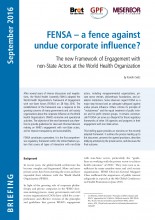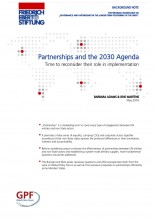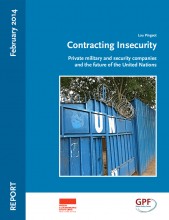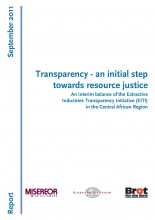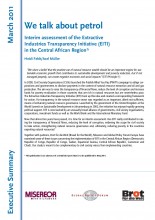
Latest on Corporate Influence and Accountability (GPF) - Archive
By Barbara Adams and Sarah Dayringer
It may sound like an issue for health specialists, but at the UN high-level meeting on antimicrobial resistance (AMR) ministers and heads of state from around the world made clear that it is more than that it appears.
This is the fourth time that the UN General Assembly has addressed health issues. As the representative of Portugal pointed out, this meeting “is proof of global recognition of this problem and how important an issue [...]
During the session on “accountability and transparency of multi-stakeholder partnerships” held in the framework of the Partnership Forum at the UN, Barbara Adams from Global Policy Forum and Social Watch said that partnerships are based in a win-win dynamic but there is a need to understand of what is “win-win”.
Would be beneficiaries of such initiatives have to be included, she argued. “We need to look and see how the contribution of partnerships has benefits. We need a more systemic [...]

"Follow the money” is the recipe for good investigative journalism and Fit for Whose Purpose does precisely that for the institution created to defend global public goods. Digging into the numbers behind the funding of the United Nations, Adams and Martens uncover a trail that leads to corporate interests having a disproportionate say over the bodies that write global rules. This book shows how Big Tobacco, Big Soda, Big Pharma and Big Alcohol end up prevailing and how corporate philanthropy [...]
The outcome document for the Third International Conference on Financing for Development (FfD3) is being finalized at the United Nations in New York. This is a key moment to make an assessment and influence the issues under negotiation to ensure progress is not lost in the interests of fact-tracking consensus. The outcome document must establish new ground on a range of issues such as combatting illicit financial flows and global tax cooperation.
Key to this is action on proposals of [...]
Civil society has put forward and worked hard to defend a vision of a new Post-2015 Agenda that will approach human rights, environmental integrity and the urgency of dealing with climate change in a way that addresses the injustice and inequity inherent in gender, social, political and economic relations at all levels.
As we approach the final phase of agreeing on the framework, there are clear indications that we are further from reaching this vision in the post-2015 agreement than [...]
Civil society organizations and social movements around the world struggling against corporate abuse achieved a first victory in June last year when the UN Human Rights Council adopted Resolution 26/9, establishing an Intergovernmental Working Group whose the mandate shall be to elaborate an international legally-binding instrument to regulate the activities of business enterprises. However, there remain important challenges to ensure that a robust treaty ensuring genuine corporate accountability and access to justice will be drafted in a participatory and transparent [...]

A new policy paper published by the German NGO Forum on Environment and Development argues that the G8 New Alliance for Food Security and Nutrition in Africa will not be able to combat hunger and food insecurity in Africa. On the contrary, the paper, to which Global Policy Forum contributed, points out that the New Alliance is mainly focused on providing multinationals with opportunities to reap profits through the creation of environments conducive to investment. Thus, the paper calls for [...]
In a recently released short documentary, Brazilian initiative Justiça nos Trilhos (JnT) explains about social and environmental conflicts in iron ore extraction in the Amazon region of Carajás, northern Brazil—and the connections with the German car industry. Again and again, mining and processing of natural resources has involved violations of human rights and an escalating of violence and conflicts. Largely, this problem has lately received public attention as far as diamonds, coltan and other “conflict commodities” are concerned. However, the [...]
In numerous countries, the exploitation of mineral and fossil natural resources is resulting in violations of human rights, rising poverty and violence. Many partner organisations of “Brot für die Welt” and MISEREOR are campaigning for the people affected. They are urging that those concerned actually benefit from the exploitation of natural resources in their countries, that they can realise their human rights, that the environment is not destroyed, and, above all, that they are comprehensively informed about plans, projects and [...]
“We share a belief that the prudent use of natural resource wealth should be an important engine for sustainable economic growth that contributes to sustainable development and poverty reduction, but if not nmanaged properly, can create negative economic and social impacts”(EITI Principle 1)
In 2000, Civil Society Organisations (CSOs) launched the Publish What You Pay (PWYP) campaign to oblige corporations and governments to disclose payments in the context of natural resource extraction and oil and gas production. The aim [...]

One day before UN Secretary General Ban Ki-Moon chaired the second "Global Compact Leaders Summit" in Geneva, a group of NGOs sponsored a hearing to assess the UN corporate initiative. Speakers addressed the failure of the Global Compact to hold its signatories accountable for basic human rights, as well as environmental and labor standards. The speakers also discussed how many translational corporations exploit their Global Compact memberships to advance their public relations, and oppose initiatives calling for binding international regulation [...]

